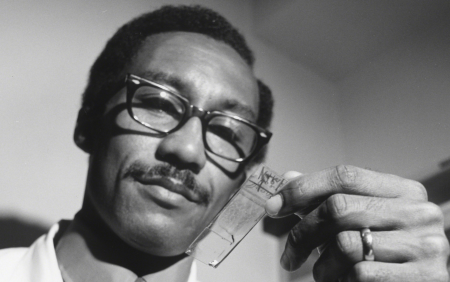
St. Jude treatment of sickle cell disease hits close to home for this Mississippi pottery shop

July 06, 2021 • 4 min
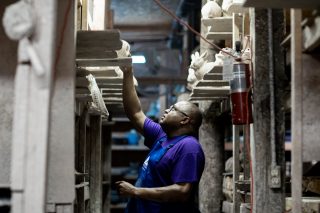
MOUND BAYOU, Mississippi — Peter’s Pottery is lined with plates and vessels in colors that suggest the land where they were made: the speckled white of cottonwood seed, lichen green, silty brown, and “Bayou Blue,” their signature color, the dusky hue of last light on summer nights. Colors more earthy than gem-toned, though the town of Mound Bayou, where Peter’s Pottery was born, was once called the Jewel of the Delta.
When the local hospital was shuttered in 1983, that closure affected this rural community as hospital closures have affected many others like it. But that’s about where Mound Bayou’s similarity to other communities ends. Mound Bayou was unique from its inception.
Founded in 1887 by formerly enslaved African Americans organized by Isaiah Montgomery, Joshua Montgomery and Benjamin Green — former slaves themselves — this town was a radical idea that became an unprecedented reality: a town built by and for African Americans, the nation’s largest self-governed, self-reliant, Black community. There were Black-owned mills, gins and warehouses; a train station, a school system, parks, a library, businesses; and the now-shuttered hospital, then called Taborian Hospital, where Black doctors tended Black patients from all over the Delta.
Peter Woods is the youngest of 11 children born to Mound Bayou sharecroppers who saw to it that all 11 went to college. What would become his career began with mud pies.
“When I was a baby, we would go to the fields where they were picking cotton and well, water coolers at that time were metal, so water would drop down on the ground, and we didn't have anything else to do, so we just started forming different shapes and things out of the mud, my sister and I, just to pass the time away.”
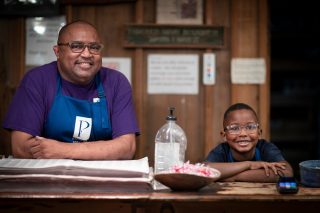
Peter Woods with his great-nephew, R.J.
By 13, he was into clay. He doesn’t remember what his first piece of pottery was, but he’s sure his 97-year-old mother still has it somewhere.
By 1998, when Peter and his brothers founded a family pottery business, Mound Bayou was already well into decline. But they made a success story from humble beginnings, literally shaping a future from Mississippi mud.
Their creations began drawing collectors from all over and have been shipped across the globe. As the business blossomed, they began giving back, funding scholarships for local high school seniors, supporting local first responders and, with the arrival of R.J., Peter’s great-nephew and “spitting image,” raising money for St. Jude Children’s Research Hospital, where R.J. receives treatment for sickle cell disease.
From the time it opened its doors in 1962, St. Jude, like Mound Bayou’s old Taborian Hospital, provided unprecedented access to care for African-American patients in the segregated South. St. Jude was the first fully integrated children’s hospital in the region. Just a month into its operation, it launched its sickle cell program, now one of the largest sickle cell programs in the country, with its very first research grant.
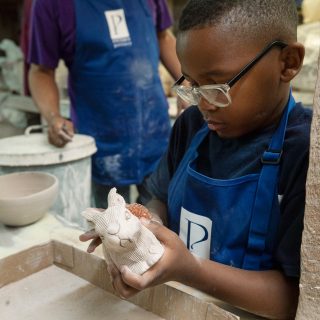
Sickle cell disease, the most common inherited blood disorder in the United States, can occur in all races, but it is more prominent in those of African, Latin and South American descent. It occurs in about 1 in 365 African-American babies born in the U.S.
In the last 20 years, advances led by St. Jude in the treatment of sickle cell disease have lifted the life expectancy for a sickle cell patient by 20 years.
“After I saw all that St. Jude was doing for us,” said Peter, he began hosting a holiday fundraiser for St. Jude. Each year, he throws open his home, decorated to the hilt for Christmas with a different theme and tree in every room, and offers refreshments and prizes for the cost of a donation to St. Jude. “R.J. is 8 years old now, and even over those years there's been an increase in knowledge about the disease, treatments and all of that. It's much easier to deal with, and to fight.”
On occasion, R.J. still suffers the pain crises that are a hallmark of sickle cell disease, but overall he’s doing well.
“He's very smart, very intelligent, makes all A's,” said Peter proudly. “He loves to play the piano; he loves the drums. He's a grown little man.
"When he was 5 years old, I brought him up to St. Jude by myself and I pretended that I didn't know what to do. He walked me through the whole process, and when they were going to draw blood, he just throws his arm out for them, you know, so he was a big boy," Peter recalled. "That just made me very proud of him. All his life he's been an inspiration, and I just love him.”
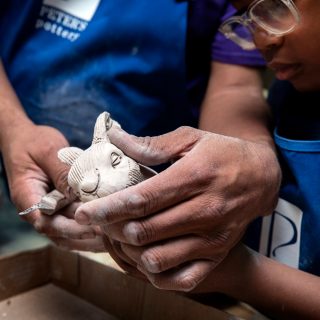
Sometimes R.J. comes into the pottery shop, and when he does, he is put to work, smoothing rough edges or adding detail to a piece of pottery bound for a still-unknown destination.
Peter doesn’t know if his great-nephew, whom he has taken under his wing, will follow in his footsteps in the family business.
But as St. Jude’s work on sickle cell disease continues, Peter has faith in a promising future for R.J., wherever in the world he goes.












